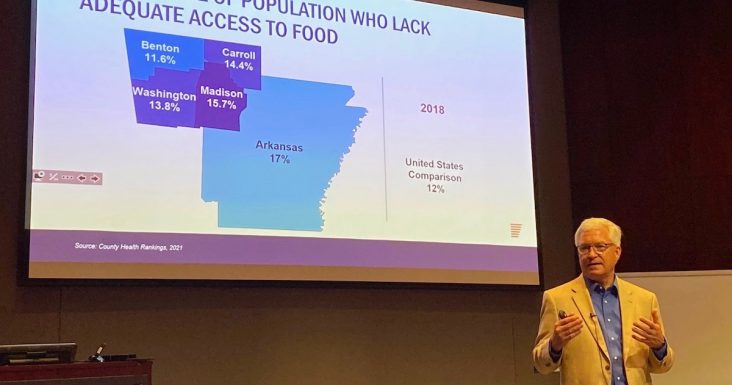Summit focuses on better child health outcomes in Northwest Arkansas
by June 17, 2021 6:01 pm 919 views

Dr. Joe Thompson, CEO of Arkansas Center for Health Improvement in Little Rock, discusses child health issues.
Northwest Arkansas educators and policy makers met at the University of Arkansas in Fayetteville Thursday to discuss the nutritional needs and wellness issues facing children in the region.
Pearl McElfish, vice chancellor at University of Arkansas for Medical Sciences, said it’s not enough for Northwest Arkansas to be the healthiest economic region in the state when so many children are at risk for food security, living in poverty and facing high obesity rates. Ryan Cork, health ambassador for the Northwest Arkansas Council, said the event was aimed at laying the groundwork for an action plan to improve the health and well-being for the children today who will be the leaders for tomorrow.
Dr. Joe Thompson, CEO of Arkansas Center for Health Improvement in Little Rock and the keynote speaker, said this kind of grassroots effort is a great start to tackling some very hard issues around equal access and the just opportunity for good health.
“We don’t have a health care system in this country, we have a sick-care system,” Thompson said.
All the compensation and reimbursements for health care professionals are centered about treating the sick, not keeping people healthy, he explained.
With that, Thompson gave a 30,000-feet view of the region’s health care concerns around children. He said 8,000 babies are born in Northwest Arkansas annually – or 25 babies every day. Thompson said the newborns are the biggest assets for the area’s future. But while each family has the same hopes and dreams for their kids 1,000 of those babies born in Washington County and slightly less in Benton County are born into poverty. They will live in at-risk zip codes where 50% of the populations are at, or below the poverty level. He said the cards are stacked against those in poverty to lead healthy lives.
“We need more investment in early healthcare education for those in preschool and it needs to continue through grade school. More health education is needed across the board. Arkansas children get health taught in the ninth grade and at that point the train has left the station. We need more health and well-being curriculum in the early grades,” he said.
Thompson also said the impact of COVID-19 was not evenly distributed around the country. He said the brunt of the impact was concentrated in households where parents worked in processing plants and at retail – places in which they could not work from home. He said they didn’t have the resources to stay home and many lived in multiple family households where children often fell behind because of lack of internet or parental intervention.
He said mental health stress also escalated among adults living in the at-risk zip codes of Fayetteville and Springdale to more than half the days in a month. Physical stress was also present half the time. Thompson said none of this promotes health and well-being at home.
Three areas the Northwest Arkansas Council, UAMS and other stakeholders have set their sights on include reducing obesity in children, more education and access to mental health wellness and the risks associated with e-cigrettes and vaping. Thompson said these are monumental challenges but workshops like Thursday and the followup that will continue under the leadership of the Northwest Arkansas Council is a big step forward.
Arkansas ranks fifth in the nation in childhood obesity with 20.2% of kids between ages 10 to 17 being obese. Thompson said in Northwest Arkansas 12.9% of kids enter kindergarten obese, and by eighth grade that rises to 25.3%. He said education and intervention must start earlier and it will take a concerted effort to reduce the numbers.
UAMS said 22% of Arkansas eighth graders have tried e-cigarettes, rising to 44% for high school seniors. The average age of first-time use is 14. Cork said there must be more education and better messaging about the risks associated with vaping. He said the state has aired just one commercial about the risks of vaping.
“That’s why we are talking about it today, it was an issue brought to the table by health educators along with mental health as areas that need more attention. We hope to take the discussion notes from today and build out a program for the NWA Health Summit in October where we set forth an action plan to fill the gaps, expand programs and access while fostering ongoing education,” Cork said.
